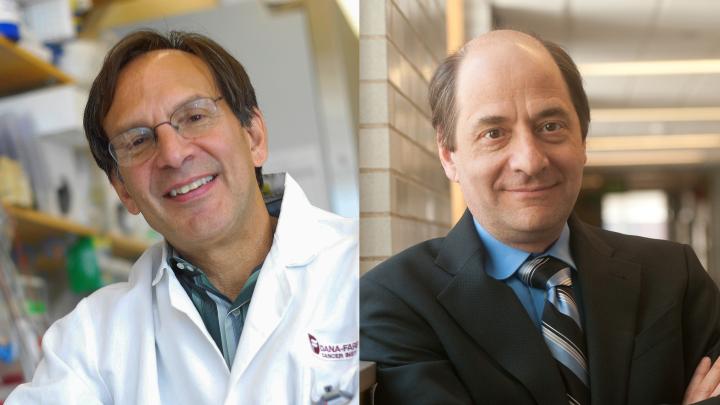One of the many benefits of endurance exercise (a topic covered extensively in a 2004 Harvard Magazine cover article and subsequently), is that it stimulates the growth of new brain cells and improves cognitive function, particularly in the elderly. Now scientists at the Dana-Farber Cancer Institute, whose work this magazine has followed closely for nearly a decade, are one step closer to creating a drug that may provide some of the same neurological benefits (described here in earlier coverage) that endurance exercise provides, but without the hard work.
The researchers isolated a protein that increases with endurance exercise and gave it to sedentary mice. The protein turned on genes that promote brain health and lead to the growth of new neurons involved in learning and memory. Korsmeyer professor of cell biology and medicine Bruce Spiegelman and Pusey professor of neurobiology Michael Greenberg (head of the department of neurobiology at Harvard Medical School), the senior coauthors, together with first author Christiane Wrann, a postdoctoral fellow in Spiegelman’s lab, have now reported their findings in Cell Metabolism.
Exercise increases the activity of a molecule that raises metabolism in both humans and mice, causing them to burn more calories. Spiegelman’s lab has previously shown that this molecule is at the beginning of an important biological pathway—the headwaters, as it were, of a stream that regulates many of the effects of exercise on the body. Some of the other downstream changes have been described previously in this magazine, ranging from muscle-fiber-type switching that creates "Mighty Mice," to activation of healthy, calorie-burning “brown fat” that offers the potential of a treatment for obesity and diabetes. Spiegelman and his coauthors' latest work links this molecule—PGC-1 alpha—to a protein called FNDC5 (and its variants, including irisin, as described in an earlier article published by this magazine) that boosts the expression of a brain-health protein known as BDNF (brain-derived neurotrophic factor)—colorfully called in earlier Harvard Magazine coverage, “Miracle-Gro® for the brain.” BDNF not only promotes the development of new nerves and synapses in the hippocampus of the adult brain, but also preserves existing brain cells.
If FNDC5 can be made in a stable form and developed into a drug, the investigators noted in a press release, it might lead to improved therapies for cognitive decline in older people that is caused by such neurodegenerative diseases as Alzheimer’s and Parkinson’s. Spiegelman cautioned that more research will be required to determine whether the protein actually improves cognitive function in animals, but says, “What is exciting is that a natural substance can be given in the bloodstream that can mimic some of the effects of endurance exercise on the brain.”









